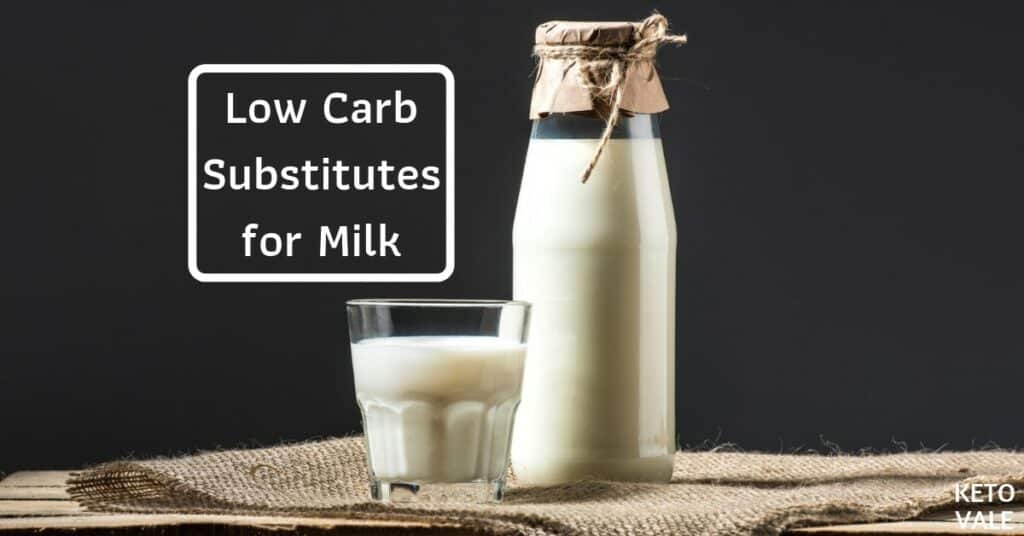Giving up milk on the ketogenic diet can be hard for many people to do. This is because you’ve probably been drinking it since you were a kid, and milk is hidden in a ton of recipes. How do you make a milkshake or smoothie without one?
The problem is that cow’s milk is full of sugar and is off-limits on a low-carb diet. Plus, some research indicates that humans weren’t born with the gene that digests milk, which means that people shouldn’t be drinking it anyway.
Luckily, there are plenty of low-carb, non-dairy milk options that you can use in place of cow’s milk that taste great and won’t kick you out of ketosis.
In this article you’ll find our list of the best keto-friendly substitutes for milk that you can add to your food list and why traditional cow’s milk is not recommended on the keto diet.
Why Isn’t Cow’s Milk Keto-Friendly?
Cow’s milk is extremely controversial among the healthcare community. Many health experts will tell you that you don’t need milk for strong bones and that it can even negatively impact bone health.
In fact, one study found that high milk consumption was linked to higher fracture incidence in women. It was also linked to higher mortality (1).
On the other hand, American Pediatric doctors recommend that mothers give their children cow’s milk beginning at the age of one year old to supply their calcium and vitamin D needs.
The information is conflicting. Who are you supposed to believe? It probably depends on whether or not you can digest milk without any problems.
According to one study, humans weren’t even born with the ability to digest cow’s milk. It wasn’t until a group of ancient European farmers who made cheese developed the gene that digests milk (2).
Even today, not everyone has the ability to digest cow’s milk. In fact, research shows that only 35 percent of the Earth’s population (mostly Europeans) can digest lactose without any problems. That’s not a lot of people! (3)
Many people walk around with dairy intolerances every day and don’t even realize it. If you have intestinal bloating, gas, pain, constipation or diarrhea after consuming dairy, then you might be one of them.
Additionally, drinking milk from cows that have been treated with hormones and antibiotics can lead to hormone problems as well as antibiotic-resistance in humans.
If you’re on a low-carb diet, then milk is off limits no matter what your stance on dairy is. This is because it contains too many carbs in the form of simple sugar.
On the other hand, cheese is safely allowed on low-carb diets because it does not contain as many carbs. It also contains a great source of fat.
Here is the nutritional breakdown of a one-cup serving of skim (no fat) milk (4):
- 79 calories
- 0 gram of fat
- 11 grams of carbs
- 8 grams of protein
A List of Low-Carb Substitutes for Milk
As you can see, a one-cup serving of cow’s milk contains 11 grams of carbs in the form of sugar. There is no fiber in milk, so there is nothing to stop these carbs from going straight to your blood sugar levels.
Not to mention, most people find milk extremely hard to digest. Since nuts are keto-friendly, therefore, nut milks are also a good choice for keto.
Here are the top low-carb substitutes for cow’s milk that you can safely enjoy on the ketogenic diet.
#1. Almond Milk
Almond milk is probably the most common substitute for cow’s milk. You can find it just about anywhere. It’s low in calories, high in good fat, and contains very few carbs.
When you’re buying store-bought almond milk, make sure you buy the kind that does not contain added sugar or carrageenan, which is an additive that binds to your digestive tract and causes inflammation.
Here is the nutritional breakdown of a 100-gram serving of unsweetened almond milk (5):
- 15 calories
- 0.6 gram of carbs
- 0.0 gram of fiber
- 0.6 gram of net carbs
- 0.6 gram of protein
- 1.1 grams of fat
Making your own almond milk at home is easy. You’ll need to invest in a nut milk bag. Once you do, you can make any nut milk from home.
To make, soak your almonds in water overnight. The next morning, rinse them and add them to a blender with fresh water.
Blend the water and soaked almonds on high for up to a minute. Then, using your nut milk bag, strain the water from the nuts into a separate container. That’s your milk!
It should look like the color of real milk, but not as white. For added sweetness, try adding stevia and a bit of salt to the blender before blending to enhance the sweetness.
Try using almond milk in this homemade panna cotta recipe.
#2. Coconut Milk
Coconut milk might be lowest in carbs out of all milks on this list. It’s also rich, creamy and delicious, and goes great in recipes that range from meats to smoothies, coffee and desserts.
Coconuts are highly anti-inflammatory and provide a great source of medium chain fatty acids, which convert directly to ketones in the body to enhance energy and keep your brain sharp.
Here is the nutritional breakdown of a 100g serving of unsweetened coconut milk (water, organic coconut extract, organic guar gum) (6):
- 59 calories
- 5.9 grams of fat
- 1.7 gram of carbs
- 0 gram of protein
*The nutrition values might vary from brand to brand. Full-fat coconut milk and coconut cream can have up to 24 grams of fat per 100g serving.
Coconut milk is a bit hard to make from home because you have to crack the coconut open. For this reason, most people buy coconut milk at the store.
Again, look for a brand that contains no added sugars and as few ingredients (preservatives) as possible.
Here are some recipes to use coconut milk in:
- Easy Chicken Curry With Coconut Milk
- Beef Curry Soup with Coconut Milk
- Keto Coconut Ice Cream
- Avocado Coconut Chia Smoothie
#3. Flax milk
Flax milk is made by taking cold-pressed flaxseed oil and mixing it with filtered water until you get “milk.” It’s important that the oil is cold-pressed to preserve all the nutrients in the flax oil. Heating it to high temperatures will kill some of the nutrients off.
Flax is high in omega 3 fatty acids, which has been shown to support heart health, fight depression, and help manage obesity. It’s also a good source of vitamin E.
You can read more about the health benefits of flax here.
Here is the nutritional information of a one-cup serving of unsweetened flax milk (7):
- 25 calories
- 2.5 grams of fat
- 1 gram of carbs
- 0 gram of fiber
- 0 grams of protein
Flaxseed milk is something that you could make at home using the same method that you do with regular nuts.
Soak the seeds overnight in water, blend them on high in a blender along with fresh water, and then put them through a nut milk bag to extract the liquid. You could also use a cheesecloth to strain the milk.
Most people buy flaxseed milk. If you buy store-bought brands, then be sure your brand does not have added tapioca starch and cane sugar. Flaxseed milk goes great in smoothies.
Try it as the base in our Avocado Coconut Chia Smoothie.
#4. Cashew Milk
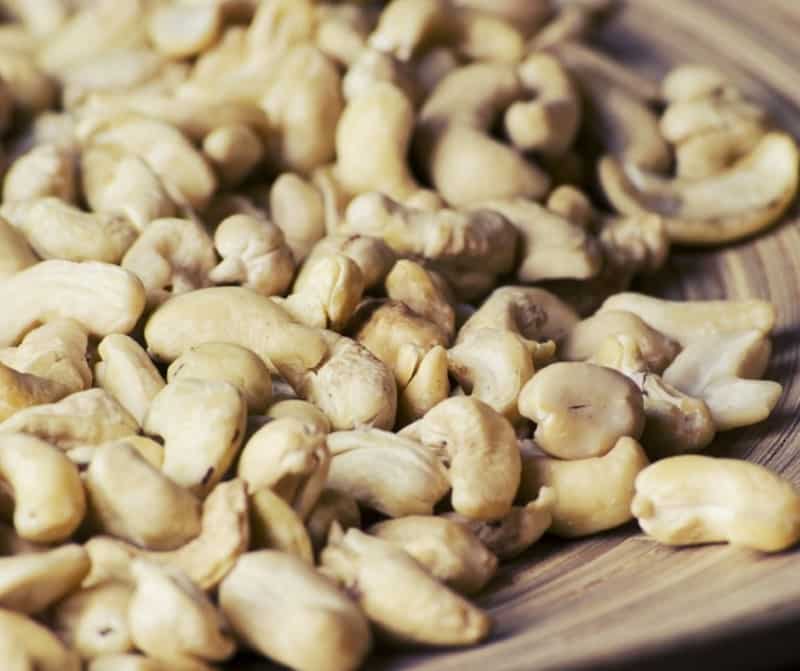
Cashew milk is a great low-carb milk because it has a rich, creamy flavor and blends well with just about anything you add to it. Plus, it has a smooth, white color that looks very similar to real cow’s milk!
Cashews contain healthy fats that have been shown to improve heart health. Like almonds and coconut, cashews are low in carbs and suitable for the ketogenic diet.
Here is the nutritional breakdown of a one-cup serving of unsweetened cashew milk (8):
- 24 calories
- 2 grams of fat
- 1 gram of carbohydrates
- 0 gram of fiber
- 1 gram of protein
As you can see, cashew milk contains fewer calories than traditional milk we recommend using it in smoothies or in place of coconut milk when baking curry dishes. Either milk will give you great texture and flavor.
You can make your own cashew milk at home using the above-mentioned method with a nut bag or cheesecloth.
If you buy a store-bought brand, make sure it does not contain added sugar, tapioca starch/syrup, pea, date, glucose syrup, etc…
#5. Macadamia Milk
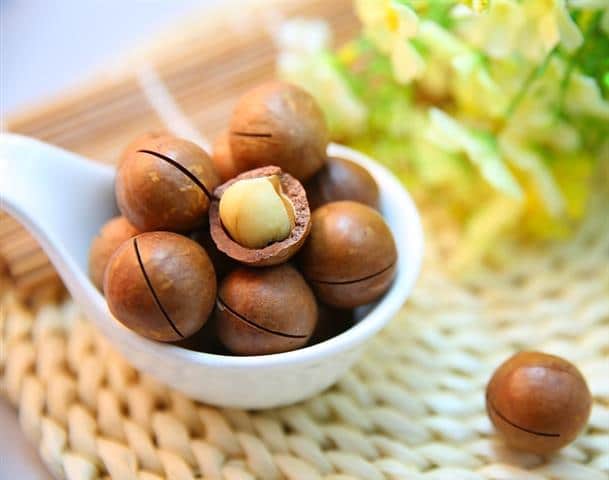
Macadamias are the perfect low-carb, high-fat nut. In fact, the only nut that that has a lower carb or higher fat content than the macadamia nut is the pili nut.
They are extremely rich and creamy, due to their high-fat content, which makes them the perfect nut for ketogenic dieters. Macadamia nuts tend to be expensive, but they are great for your heart and keeping cholesterol levels down.
Here is the nutritional breakdown of a one-cup serving of unsweetened macadamia milk (9):
- 55 calories
- 5 grams of fat
- 1 gram of carbs
- 0.5 gram of fiber
- 0.5 gram net carbs
- 1 gram of protein
As you can see, macadamia milk has twice the calories of cashew or almond milk, but it’s still a relatively low number. The thing you want to keep an eye on is the carbohydrate content, and macadamia nut has 0 net carbs!
You can always make your own nut milk at home using the methods we described above. Macadamia milk is harder to find than almond or coconut milk.
If you buy a store-bought brand, make sure it contains no added sugar and starch.
#6. Hemp Milk
Hemp milk is milk that is made from hemp seeds that have been soaked in water. Hemp is a plant that is known for being high in fiber. The high fiber content of hemp seeds helps keep the net carbs down in the milk.
Hemp is a complete source of protein which means that it contains all nine essential amino acids. It’s also a great source of healthy fatty acids, especially omega 3 fatty acids, as well as various vitamins and minerals.
Here is the nutritional breakdown of a one-cup of unsweetened hemp milk (10):
- 79 calories
- 8 grams of fat
- 1 gram of carbs
- 0 gram of fiber
- 1 gram of net carbs
- 2 grams of protein
Like macadamia milk, hemp milk is hard to find in stores. The best place to look is at your local health store. Again, make sure there is no sugar added.
Hemp milk tends to be heartier than other milks. We recommend using it in this keto-friendly oatmeal recipe.
#7. Pumpkin seed milk
Pumpkin seed milk is even less common than hemp seed and macadamia nut milk, but it’s an excellent low-carb milk that you can make at home.
Pumpkin seeds are full of antioxidants and healthy fats to help reduce inflammation and fight oxidative stress. They contain a good amount of vitamin E for healthy looking skin. Pumpkin seeds are especially beneficial for supporting prostate health.
Here is the nutritional breakdown of one ounce (20g) serving pumpkin seed (11):
- 126 calories
- 5.5 grams of fat
- 15 grams of carbs
- 5 grams of fiber
- 10 grams of net carb
- 5.3 grams of protein
The actual nutrition values of pumpkin seed milk will be much lower than this depending on how you make it. Assuming you add only pumpkin seeds and water to your blender and strain the liquid to remove the solid particles.
Pumpkin seeds are relatively inexpensive to buy. You can make your own milk at home by soaking a bunch of them in water overnight. The next morning, rinse them off, add them to a blender with fresh water, and blend!
Separate the pulp from the milk using a nut milk bag or a cheesecloth. You can even add in stevia, monk fruit, erythritol, and some sea salt for flavor.
#8. Pili nut milk
Pili nuts are relatively new to the keto scene. We had never heard of them before until we had the pleasure of sampling them for ourselves! You can read the review here.
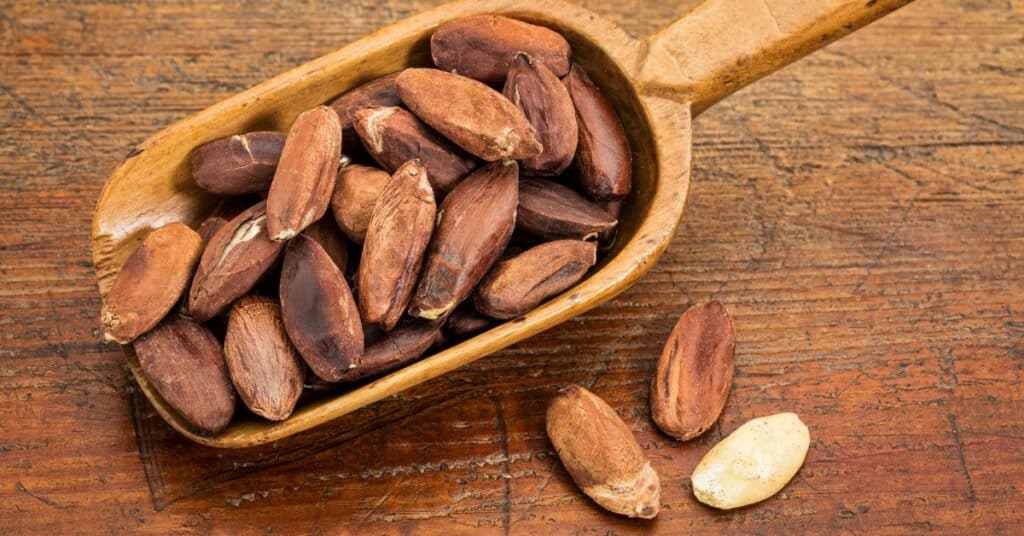
Pili nuts have the highest fat and lowest carbs of any nut, making them the perfect keto nut. They’re also full of protein and taste like salted sticks of butter.
Right now, you can only buy them online but the founders are working on making them available in stores in the US.
Here is the nutritional breakdown of a one-ounce serving of pili nuts:
- 204 calories
- 23 grams of fat
- 1.1 grams of carbs
- 3.1 gram of protein
To make pili nut milk, you would have to buy several bags of pili nuts and blend them together with water in a high-speed blender. Since pili nuts are so low in carbohydrate, when mixing with water and strain the solid parts, the final milk product contains almost no carbs.
Pili nuts are already activated, which means they have been soaked in water overnight before being sold to you.
So if you’re making pili nut milk at home, you might not need to soak them like you would need to with other nuts. Pili nuts have a soft, delicate texture. You might be OK skipping the soaking step and moving on to the blending and straining steps.
#9. Brazil Nut Milk
Eating just two Brazil nuts a day gives you 100% percent of your daily recommended intake of selenium, which is an important mineral with antioxidant abilities in the body.
If that’s not reason enough to drink Brazil nut, then consider that they are high in good fats and low in carbs. It would also be relatively easy to make Brazil nut milk at home because you can find Brazil nuts just about anywhere.
Here is the nutritional breakdown of a 1oz (28g) serving of Brazil nut (12):
- 187 calories
- 19 grams of fat
- 3.3 gram of carbs
- 2 grams of fiber
- 1.3 grams of net carbs
- 4 grams of protein
The actual nutrition values of Brazil nut milk will be much lower than this because you will blend the nuts with water and strain the liquid to remove the solid particles.
In addition to being an excellent source of selenium, Brazil nuts are also high in vitamin B12. Brazil nut milk is hard to find in stores. Your best bet is to look at your local health store.
#10. Soy milk
There is some controversy as to whether soy milk is keto-friendly because soy is a legume and not a nut. But there is no denying that soy milk is much lower in carbs than traditional cow’s milk.
Soy milk is low-carb, so it’s a good choice for general low carb diets, but it’s not recommended on a strict keto diet, unless you’re doing vegan or vegetarian version of keto, since soy is probably already your main source of protein.
The good news is that you can find soy milk at any grocery store in the US. But be careful as they tend to be flavored with sugar and other additives.
Here is the nutritional breakdown of a one-cup serving of organic, unsweetened soy milk (13):
- 79 calories
- 4 grams of fat
- 4 grams of carbs
- 1 gram of fiber
- 3 grams of net carbs
- 7 grams of protein
Soybean milk can be made at home just like any other milk. You would need to buy the soybeans, soak them in water overnight and blend them with water the next day. Separate the pulp from the water using a nut milk bag.
Conclusion
Cow’s milk is not keto-friendly because it contains too many carbohydrates. A one-cup serving of skim milk contains 11-12.5 grams of carbs. These are all in the form of simple sugars, which means that they immediately spike your blood sugar levels.
There is additional research to show that cow’s milk is not a good way to protect your bones. In fact, humans were not initially born with the gene to digest lactose. This is something that European farmers later developed after working with cows. For many people, milk is a source of intestinal gas and bloating.
The good news is that there are plenty of non-dairy, low carb milk options that you can have on your keto food menu. Almond milk and coconut milk are the two most common. You can find these in just about any grocery store across the United States. It’s also easy to make your own nut milk at home. You’ll need to invest in a nut milk bag or a cheesecloth.
If you’re buying store-bought milk, then be sure to buy a brand that does not have added sugars or carrageenan, which is an additive that has been shown to cause digestive problems. Some common brands are Silk, Blue Diamond, Califia Farms and So Good.
Enjoy this post? Share to save for later!
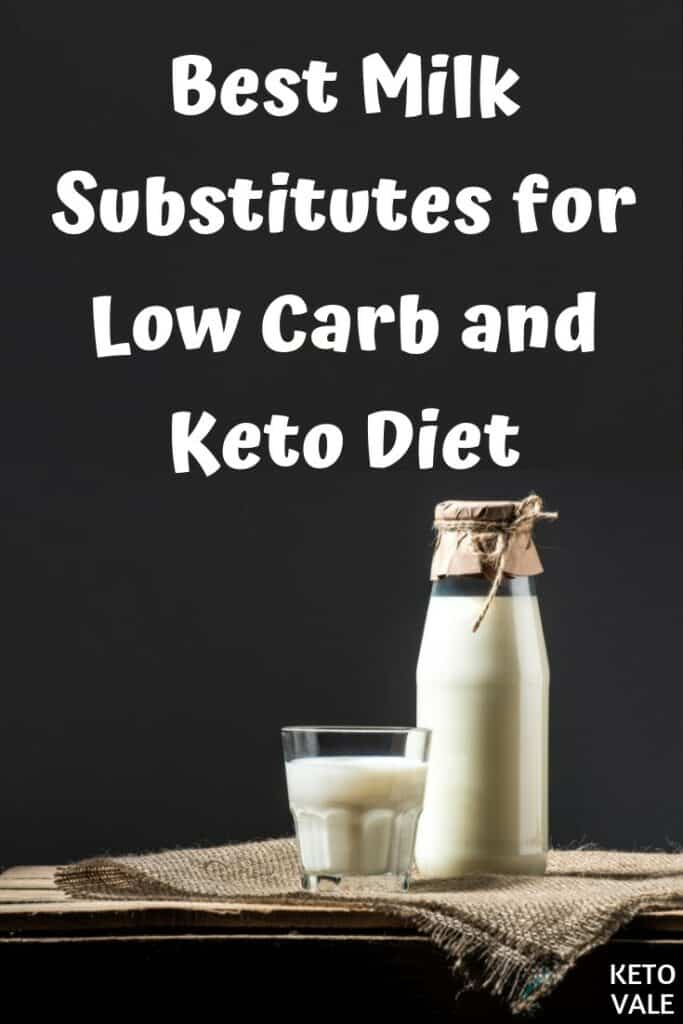
Photo credit: VadimVasenin/Depositphotos.com
